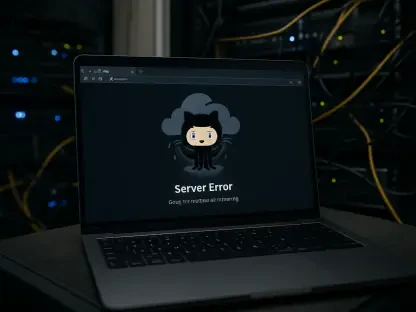In today’s fast-paced digital world, the software development lifecycle (SDLC) is undergoing a transformative shift. Traditional approaches that focus on separate phases for development, security, and operations are being replaced by the revolutionary integration of these functions known as DevSecOps. This shift is not just a trend but a necessity driven by the escalating frequency of cyber threats and the increasing demand for rapid, secure software deployment. As organizations strive to stay ahead in the competitive landscape, the need for integrated, seamless security measures has never been more paramount. By embedding security throughout all stages of development and operations, DevSecOps is redefining how we approach and manage software security.
The Essence of DevSecOps
At its core, DevSecOps stands for the amalgamation of Development, Security, and Operations. This approach emphasizes embedding security measures at every stage of the SDLC, from initial design through to deployment and maintenance. By integrating security into the workflow, DevSecOps ensures that vulnerabilities are identified and addressed early in the process, reducing the risk of breaches and improving overall software quality. This paradigm shift fundamentally changes how we think about software security, treating it as an integral part of the development process rather than an afterthought. It ensures that security is not just a final checkpoint but a continuous commitment embedded in every facet of the development cycle.By bridging the traditional silos that separated development, security, and operations, DevSecOps fosters a collaborative environment where security is everyone’s responsibility. This holistic approach aligns with the agile methodologies that many organizations are adopting, providing a seamless blend of speed and security. The immediate identification and rectification of vulnerabilities support a more resilient software development lifecycle and foster a culture of continuous improvement. In an era where cyber threats are becoming increasingly sophisticated and frequent, the proactive security measures inherent in DevSecOps are not just beneficial but essential for organizations aiming to protect their assets and maintain customer trust.
Inherent Market Growth and Dynamics
The DevSecOps market is experiencing explosive growth, driven by the urgent need for secure and efficient software solutions. With a projected increase from US$ 6.3 billion in 2023 to US$ 45.93 billion by 2032, the market is set to grow at a Compound Annual Growth Rate (CAGR) of 24.7%. This growth can be attributed to several factors, including the rising number of cyber-attacks which force organizations to prioritize security. The increasing sophistication of cyber threats pushes companies to integrate security measures early in their development processes, ensuring that vulnerabilities are fixed before they can be exploited. This need for proactive security measures is a significant driver for the burgeoning DevSecOps market.Additionally, the proliferation of cloud-based infrastructures necessitates the use of automated security operations to ensure robust data protection. As businesses migrate to the cloud, the ability to secure these platforms becomes vital. According to the International Data Corporation (IDC), there was a 90% increase in cloud spending in 2023, highlighting the growing reliance on cloud solutions. This trend is expected to continue, further propelling the growth of the DevSecOps market. The alignment of these factors underscores why DevSecOps is becoming indispensable in modern software development. The dynamic, integrated approach of DevSecOps not only secures data but also accelerates deployment cycles, making it a critical component of the software development lifecycle.
The Role of Cyber Risks in Adoption
One of the primary drivers behind the adoption of DevSecOps is the increasing sophistication and frequency of cyber-attacks. Organizations are under constant threat from hackers who exploit vulnerabilities in software systems. By integrating security throughout the development lifecycle, DevSecOps provides a proactive defense mechanism against these threats. This approach not only helps in early detection of vulnerabilities but also mitigates risks before they can be exploited. Given the financial and reputational damage that breaches can cause, the focus on security integration within DevSecOps is a pressing necessity for companies worldwide. This proactive stance enables organizations to safeguard their systems and data more effectively, fostering a more secure digital environment.The financial and reputational implications of data breaches are significant, often resulting in substantial losses and diminished customer trust. By embedding security within the development process, organizations can better anticipate and neutralize threats, mitigating potential damages. Furthermore, the rapid and continuous nature of DevSecOps allows for quick adjustments and updates, ensuring that security measures are always up to date with the latest threat intelligence. This adaptability is crucial in an environment where cyber threats are constantly evolving, making DevSecOps an essential strategy for modern organizations aiming to protect their digital assets and maintain their competitive edge.
Accelerating Deployment Cycles and Efficiency
In today’s competitive landscape, the speed of software deployment can make or break a company. Traditional development methods often resulted in delayed releases due to security testing being a separate, subsequent phase. DevSecOps addresses this challenge by enabling simultaneous development and security procedures, expediting the deployment cycle while ensuring compliance and data protection. This dual focus allows companies to maintain a rapid release pace without compromising on security standards. Consequently, businesses can stay ahead of the curve by delivering secure, reliable software faster than ever before. This increased efficiency is vital for maintaining competitiveness and meeting customer expectations in a fast-moving digital market.The integration of security into every phase of development means that issues can be identified and addressed promptly, reducing downtime and enhancing overall productivity. By streamlining processes and eliminating bottlenecks associated with traditional development methodologies, DevSecOps significantly enhances operational efficiency. This holistic approach ensures that security is never an afterthought, but a continuous priority, allowing for faster, more secure software releases. In an era where rapid innovation is a key differentiator, the ability to quickly and securely deploy software provides a considerable advantage. As more organizations recognize the benefits of this integrated approach, the adoption of DevSecOps is expected to accelerate, driving further advancements in software development and security.
Integration of AI and Machine Learning
Artificial Intelligence (AI) and Machine Learning (ML) are revolutionizing the DevSecOps landscape. These technologies enhance threat detection capabilities and automate critical security operations, making it easier to identify and mitigate threats quickly. AI-powered tools can analyze vast amounts of data to detect anomalies and potential vulnerabilities, providing a higher level of security accuracy. These advanced analytics enable organizations to uncover hidden threats that might otherwise go unnoticed, bolstering their security posture. By leveraging the power of AI and ML, DevSecOps can deliver more precise and efficient security measures, helping to protect against increasingly sophisticated cyber threats.Moreover, ML algorithms can learn from past incidents to predict future threats, offering a dynamic and evolving security posture. This continuous learning capability allows for adaptive security measures that are always one step ahead of potential threats. The integration of AI and ML into DevSecOps not only streamlines processes but also significantly enhances the robustness of security measures. Automated tools can handle routine security tasks, freeing up human resources to focus on more complex and strategic elements. This combination of human expertise and advanced technology creates a formidable defense against cyber threats, ensuring that security measures are both proactive and responsive.
Cloud Adoption and its Impacts
Cloud-based deployments are dominating the DevSecOps market due to their inherent scalability and flexibility. With a 70% market share in 2023, cloud solutions make it easier to implement and manage continuous security practices. The on-demand nature of cloud services allows for real-time security monitoring and updates, ensuring that applications remain secure against emerging threats. This capacity for continuous security integration aligns perfectly with the principles of DevSecOps, enabling organizations to maintain robust security measures while benefiting from the scalability and cost-efficiency of cloud platforms. As cloud adoption continues to rise, it will further accelerate the integration of security into the development pipeline.The cloud’s capability to handle large-scale data storage and processing needs is vital for modern DevSecOps practices. Organizations can leverage cloud resources to support extensive security testing and monitoring, ensuring that their applications remain secure throughout the development and deployment phases. Furthermore, the flexibility of cloud platforms allows for rapid scaling of security measures, enabling organizations to respond to changing threat landscapes quickly. This adaptability is crucial in maintaining a strong security posture in an ever-evolving digital environment. As more businesses migrate to the cloud, the integration of DevSecOps practices will become increasingly important in ensuring that security keeps pace with development and operational demands.
Sector-Specific Adoption and Challenges
Different industry sectors have varying levels of DevSecOps adoption based on their specific needs and challenges. The Banking, Financial Services, and Insurance (BFSI) sector leads the adoption curve due to the high stakes involved in data breaches and regulatory compliance. Similarly, the IT & Telecommunication and Healthcare industries are rapidly embracing DevSecOps to protect sensitive personal and operational data. These sectors face unique challenges, such as stringent regulatory requirements and the need for secure data handling, making the comprehensive security approach of DevSecOps particularly beneficial. By integrating security measures throughout their development processes, these industries can better protect their critical data and comply with regulatory standards.As more industries recognize the advantages of DevSecOps, the spread and implementation of these practices are expected to grow further. The ability to quickly and effectively address security issues is particularly valuable in sectors where data breaches can have severe consequences. DevSecOps provides a proactive approach to security, allowing these industries to stay ahead of potential threats and maintain the trust of their customers and stakeholders. The growing concern over data privacy and the need for robust security measures are driving the adoption of DevSecOps across various sectors. By embedding security into every phase of development and operations, these industries can ensure that their software solutions are both secure and compliant with regulatory standards.
Regional Insights on DevSecOps Growth
North America holds a significant portion of the DevSecOps market, with a 42% global share. This dominance is driven by early adoption of cloud computing and a high incidence of cyber threats. The presence of major technology hubs and stringent data protection laws also contribute to the region’s leading position. North American organizations are increasingly recognizing the importance of integrating security into their development processes, and the adoption of DevSecOps practices is becoming more widespread. This proactive approach to security is essential in a region where cyber threats are prevalent and the cost of breaches can be substantial.The Asia Pacific region is projected to exhibit the highest CAGR over the forecast period. Tech-savvy nations like China and India are experiencing increased demand for DevSecOps owing to rapid digital transformations and cloud adoption. The growing emphasis on cybersecurity and the need to protect sensitive data are driving the adoption of DevSecOps practices in these regions. As businesses continue to embrace digital technologies and migrate to the cloud, the importance of integrating security into the development process is becoming increasingly apparent. The adoption of DevSecOps is expected to accelerate in the Asia Pacific region, driven by the need for robust security measures and the benefits of an integrated, seamless approach to software development.
Conclusion
In the contemporary digital landscape, the software development lifecycle (SDLC) is experiencing a critical evolution. Traditional methods, which segmented development, security, and operations into separate phases, are swiftly being replaced by DevSecOps—a groundbreaking approach that integrates these functions. This transformation is more than just a passing trend; it is driven by the growing prevalence of cyber threats and the urgent need for rapid, yet secure, software deployment. To stay competitive, organizations must adopt integrated and seamless security protocols, as the demand for secure software solutions continues to rise. DevSecOps addresses this necessity by embedding security throughout every stage of development and operations, from initial planning to deployment and maintenance.This holistic approach ensures that security is no longer an afterthought but a fundamental component of the entire process. By doing so, DevSecOps not only enhances the robustness of the software but also accelerates the development cycle, allowing for quicker release of innovative products without compromising on security. As organizations seek to remain ahead in an increasingly competitive market, integrating security into every facet of the SDLC becomes crucial. DevSecOps represents a paradigm shift that is redefining our management and approach to software security, making it an indispensable strategy for modern software development.









